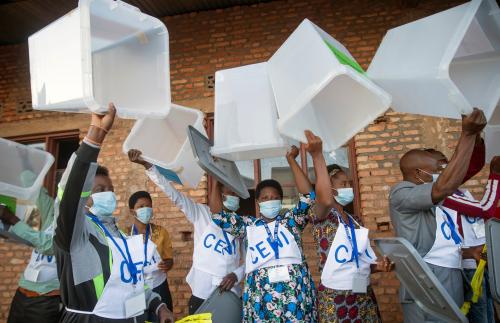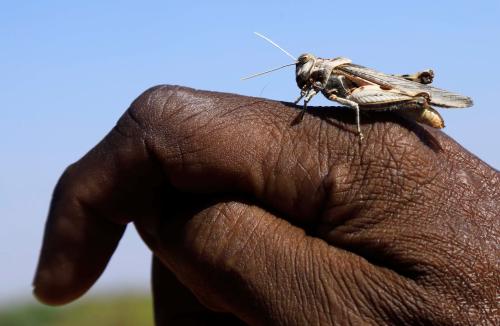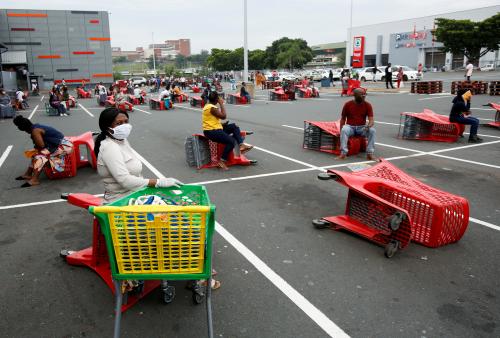Guinea-Bissau and TOGO election updates
Leadership in Guinea-Bissau remains unclear as the results of the December 29 runoff presidential election are being challenged in the country’s supreme court. Late last month, the country’s National Election Commission declared former Prime Minister Umaro Sissoco Embalo of the Movement of Democratic Change the winner with about 54 percent of the vote, and Embalo subsequently swore himself in as president. Though international election observers have dubbed the elections “transparent and free,” candidate and former Prime Minister Domingos Simoes Pereira and his party, the PAIGC (African Party for the Independence of Guinea and Cape Verde), are disputing the result. The PAIGC, which continues to control the parliament, maintains that Embalo’s inauguration was illegitimate as the country’s Supreme Court has yet to rule on the issue. In fact, parliament voted to install parliamentary leader Cipriano Cassama as interim president as the country’s supreme court considers the suit.
Meanwhile, on March 3, Togo’s Supreme Court confirmed the February electoral victory of incumbent President Faure Gnassingbé, who has ruled the West African country since 2005, with over 70 percent of the vote. Opposition leader and former Prime Minister Agbeyome Kodjo had challenged the election results, claiming election fraud and stating his party’s tallies showed that he had won with 60 percent of the vote. He also claimed that the government set up fake polling stations, had people cast multiple votes, and stuffed ballot boxes. Not long after the election, the homes of Kodjo and his vehement, influential supporter Archbishop Philippe Fanoko Kpodzro had been surrounded by government troops “for their own safety,” but Kodjo accused the government of using that time to “rig the vote.” Though many independent election observers—including those from the Catholic Church and the National Consultation of Civil Society of Togo—were barred from monitoring the election, observers from the Economic Community of West African States (ECOWAS) and the African Union confirmed that the elections were peaceful and without major incident. Notably, last year, Togo enacted a law limiting presidents to two terms, but it will not be applied retroactively, meaning there is a chance Gnassingbé could remain in power until 2030.
South Sudan implements long-sought-after, tenuous peace deal
Reports of violence continued in South Sudan this week, despite the February agreement for implementation of a peace deal to end the country’s seven-year civil war. On February 22, President Salva Kiir and rebel leader Riek Machar—sworn in that day as vice president—established a coalition government, an attempt to temper incendiary power dynamics that have fueled much of the country’s conflict. The deal utilizes a “power-sharing formula” wherein the two leaders will work together within one executive structure. Notably, the last peace deal, which fell apart in 2016, followed a similar design. Though the peace deal was initially signed in June 2018, multiple deadlines passed without successful compromises on state boundaries and integration of soldiers from both sides into one national military, and without negotiations with various rebel groups external to the peace deal. At the same time, numerous experts doubt that this peace deal will prove effective in ameliorating the conflict, citing the insufficiencies of a past, similar peace deal.
South Sudan’s civil war erupted violently in 2013, just two years after the country gained independence from Sudan, when President Kiir removed then-Deputy President Machar from office amid accusations of an alleged coup. Split along ethnic lines between the nation’s two largest ethnic groups, Dinka and Nuer (Kiir and Machar, respectively, each identify with one of these groups), conflict raged for years, resulting in more than 400,000 lives lost. Observers have accused both sides of sexual violence on a massive scale, the recruitment of child soldiers, and inadequate provision of food for communities within South Sudan. The civil war has devastated the nation, resulting in Africa’s biggest refugee crisis since the Rwandan genocide of 1994.
Ebola at an end, COVID-19 on the rise
According to the World Health Organization (WHO), the Ebola outbreak inthe Democratic Republic of the Congo (DRC) is on a trajectory to officially end by mid-April, as the final patient was released on March 3 amid celebration. The patient was discharged from a treatment center in the northeastern city of Beni after extensive testing, bringing a potential conclusion to the second-deadliest outbreak of the virus in the nation’s history. If health officials report no further cases within 42 days of the patient’s release, the WHO will consider the outbreak—which has lasted 20 months with an estimated 3,444 infections and 2,264 deaths—to no longer be a threat. Continued efforts to monitor the disease include rapid testing for potential cases and community-wide surveillance. Despite this good news, DRC Incident Manager for the WHO Dr. Abdou Salam Gueye reported heightened concern over the health outcomes in the region, especially as COVID-19 cases continue to develop across the globe.
In fact, the coronavirus has already arrived on the African continent, as the first confirmed case was in Egypt in mid-February. As of March 6, eight African nations—Algeria, Egypt, Morocco, Nigeria, Senegal, South Africa, Tunisia, and Cameroon—had announced cases. Algeria first confirmed a case on February 26 and now has at least 17. Nigeria reported the first case of the virus in sub-Saharan Africa, an Italian citizen working in Lagos, on February 27; Lagos’ airport has since tightened security for international arrivals. Morocco, Tunisia, and Senegal reported their initial cases on March 2, followed by South Africa on March 5. Cameroon most recently announced a case on March 6 after an infected French citizen arrived in Yaoundé in late February. In response, the World Health Organization has announced efforts to boost testing capacities in 33 nations on the continent.







Commentary
Africa in the news: Updates on Togo, Guinea-Bissau, South Sudan, and health challenges
March 7, 2020